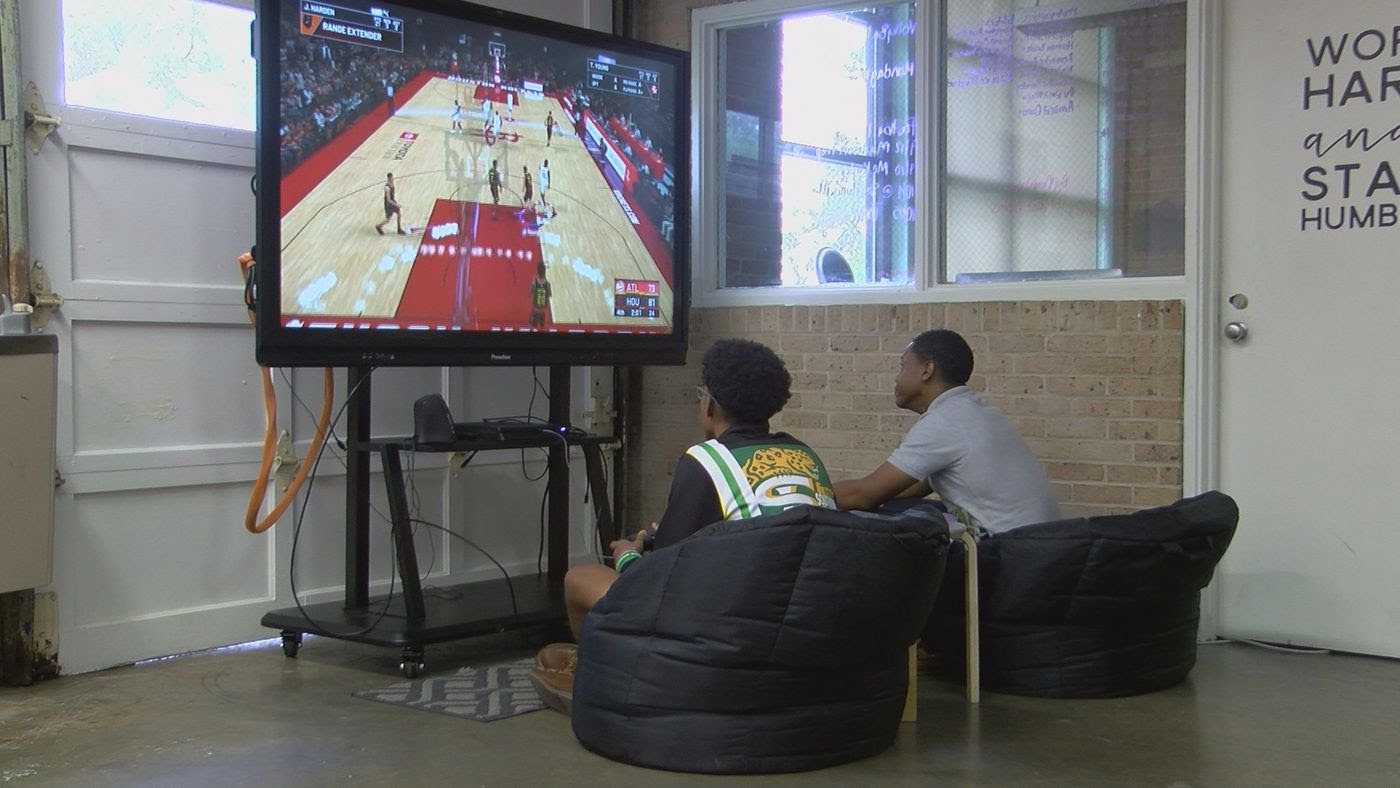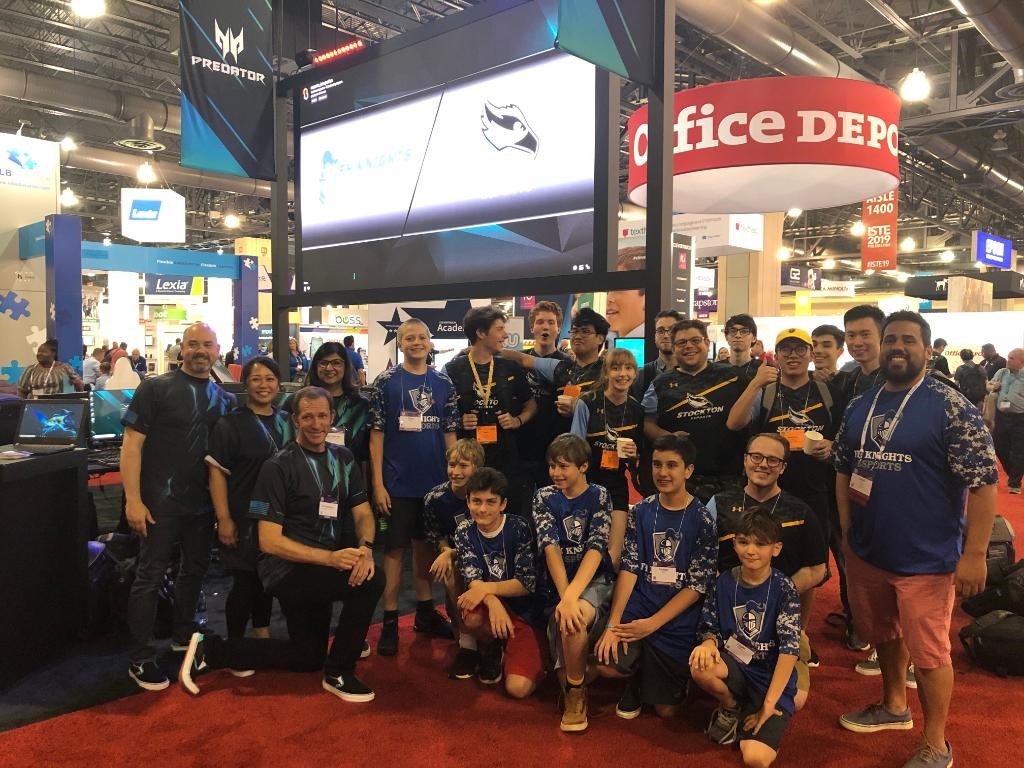When asked about his title at Knollwood Middle School, Chris Aviles humbly responds: “Teacher.”
There’s no denying it. It’s even there on his LinkedIn profile.
But, after a bit of prying, Aviles says “21st Century Skills, Technology, and Innovation Coordinator.”
Yet, he is so much more.
To a select group of students in the Fair Haven, NJ, school district and to those who look for updates and insight on his TechedUpTeacher.com site, he is not only an instructor but the man putting the exploding world of esports on the middle school map in the United States.
That’s right esports in middle school.
As video gaming catches fire at both the high school and college level, Aviles is patiently, painstakingly constructing the framework of competition for a younger generation of esports players – those from sixth grade through eighth grade. He started what is believed to be the first scholastic middle school esports team. Now, he is leading the charge to help formulate the nation’s first true competitive league for those students.
“I was the only middle school last year that had a team, so we played colleges,” Aviles says. “I asked a buddy of mine (Steve Isaacs) who had a video game club and said he could field a team to play us. That was the first experience playing another middle school. After that, we sent out a tweet and heard about a team from Pennsylvania but I only found two. Over the summer, I decided to start a league.”
Less than a year later, he has 13 teams, including competitors in Florida, Hawaii, Alaska, and New Mexico. Not bad for a guy who eight years ago couldn’t even get his former school to accept his far-fetched idea that an esports team could be beneficial.
FH Knights team members playing Rocket League.
Let the games begin
For Aviles, getting students on board with the notion of esports wasn’t a challenge. They already play the games at home and have gaming computers that bust their family’s electric bills. To them, playing esports at school was a logical, natural fit, giving them a place to compete outside of their bedrooms.
The real challenge was assuring parents that this was a good idea.
“It’s a lot of convincing people that esports is valuable, that it’s safe,” Aviles says. “We as adults have done a bad job helping students navigate the internet and gamer culture.”
But in the hands of an instructor such as Aviles, whose first interest is ensuring kids are doing well in the classroom, students not only are becoming involved more in school activities because of esports, but are also learning so many skills in the process. Aviles runs the school’s renowned Fair Haven Innovates – a 21st century life, innovation and technology program – and has been a big proponent of teaching through game-based learning and gamification, or solving problems by using game elements.
“I always like the idea of taking what kids love and teaching them through it,” Aviles says. “There are so many reasons [for students to participate in esports]: the social-emotional benefit, the sense of belonging and being part of a team,” Aviles says. “Plus, all of the things they can learn beyond that – marketing, finance, graphic design, editing video, analysis, scouting, game planning. I have kids that aren’t even necessarily players but are still vital to the team.”
With the blessing of administrators at Fair Haven schools, Aviles started a grassroots campaign in 2018 to build his FH Knights team. He found space in the school’s library, which now features “24 computers that I use as part of my STEM program.”
Aviles’ first-year team featured 12 players. This year, it has ballooned to 21.
“Some people didn’t see the vision, but I’ve benefited from by having such a supportive group of administrators,” Aviles says. “The first year, a lot of my kids didn’t fit into traditional sports, so they joined esports. I had a lot of little kids; sports wasn’t their thing. But this year, I have all different types of kids, including ones who aren’t super athletes but are still sporty, because it has become cool at my school. It makes the competition exciting.”
Chris Aviles (above right) with his FH Knights team.
The games they play
At Fair Haven, and to the delight of many parents, the Board of Education approved only one game to play, according to Aviles: Rocket League. It is a game that has few, if any, inherent violent aspects, unlike many other multi-player games. And yet, it is still highly engaging for those who play it. High-flying, tricked-out vehicles act as players in a soccer match, careening around a fenced-in racetrack while trying to kick a ball toward a giant open net.
Yet, with only one game to play, esports at the middle school level can be limiting. Some colleges, for example, may field as many as a dozen teams across a variety of games, such as Overwatch, Hearthstone or Dota 2. One of the most popular, Fortnite, is not a consideration for Aviles, as esports game play or as part of classroom instruction. Aviles, however, does admit that “Fortnite-mania” is rampant among students and he talks up the game’s merits on his website, from number-crunching math to story development and creative writing.
When asked if developers should consider making more esports games for younger audiences, he says, “They should make what they want to make,” referencing the educational computer games’ demise after 1985-released Carmen Sandiego. “Just make good games, and we will figure out how to use them.” He says Rocket League is just the right fit for his athletes.
Aviles is a gamer at heart, which makes him completely relatable to his team members. He experienced both the traditional and non-traditional ‘athlete’ worlds in high school, pairing his love of video games such as Starcraft with a passion for physical sports – he was a three-sport athlete in high school (football, wrestling and track) and played rugby in college.
For a long time, a chasm existed between those two worlds. But that is closing fast. Talented gamers at every level, some as young as middle school, are catching the eyes of much higher-level players. Some are even going head-to-head against them or playing on teams with them to vie for supremacy.
Despite esports’ popularity even among young children, finding competition on the middle school landscape has been a challenge.
Without any peers to play against, the FH Knights were forced to play Rutgers University in a friendly scrimmage. Eventually, the two sides battled in a ‘real’ tournament. Rutgers won every game. But out of those matches came something incredibly valuable and unusual – a bond between middle-schoolers and college athletes.
“It was awesome,” Aviles says. “The players at Rutgers are great, taking the kids under their wing. It’s been an amazing experience to see what I call the pipeline how they can get from middle school to college because of esports and STEM.”
The FH Knights also have met with Stockton (NJ) University’s players and even played them in a seven-game Rocket League tournament. The Knights’ roster of kids remarkably won one of the games.
“They were so excited and so proud,” Aviles says.
What’s next
A few of Aviles’ graduates have taken his cue and brought their knowledge to the next level – by helping to start a new esports team at their high school.
But for many middle school athletes, they can’t compete in school before getting to ninth grade. Their districts simply can’t afford to hop on board or simply refuse.
Concerns over safety and a lack of knowledge about esports are still ever-present. Budget constraints are an issue. And the notion of partnering with for-profit companies looking to exert influence over leagues and schools is not palatable for some, including Aviles.
“That’s the stuff [for-profit partnerships] that really makes me nervous,” he says. “It’s important that we as teachers are there to make sure we can protect our kids and keep them safe.
“Some (schools) don’t have the proper internet or devices. Luckily my school has them, but that’s not the case at every school.”
Aviles and others who have caught onto the craze at the middle school level are pushing forward, despite so many obstacles. The global esports industry will reach $3 billion in 2022, triple what it is now, according to a report from Goldman Sachs. High school STEM classes have for years been using gamification to drive home messages. But now colleges are developing complete majors around game design and esports management.
There seems to be no stopping it. So, Aviles asks, why not start children early, in an enriching, well-instructed environment?
“Esports is the fastest growing industry in the world,” Aviles says. “We are letting kids see a pathway that they’ve never seen before.”

Southern Lab leads charge in Louisiana
There are so many neat stories like the one above, about an educator taking the reins of esports and building a program from the ground up.
In Baton Rouge, La., art teacher Christopher Turner sponsored his Southern Lab School team after his daughters introduced him to gaming and several of his students told him they played. Now the school is competing against McKinley High, University High, Lee Magnet High, Woodlawn High, Denham Springs High and St. Amant High. The K-12 school team comprised of 13-18-year-olds is part of the High School Esports League and competes in Rocket League on the PlayVS platform.
“The kids are over the moon,” Turner says. “We only have 350 students at our school, so for 45 kids to join is amazing. I had to educate students and parents about the benefits of the esports ecosystem. Our club has four pillars: academics, competition, community, and careers.”
Southern Lab, like many other high school startups, is fundraising to try to outfit the program with new computers and furniture. It is the lab school for Southern University, which doesn’t have a team. But with a strong pipeline at the high school level, Turner says he is trying to convince the college that’s it’s a worthwhile investment. “I’m trying to get them to pay attention,” he says.
Noteworthy
According to reports, the Dallas Independent School District has far surpassed its initial hope of fielding 20 esports teams in its fall debut season. More than 60 schools are now competing among the district’s middle and high schools. They’re playing three games – Rocket League, Super Smash Bros. and League of Legends.
Interested in esports? Keep up with LRP’s Academic Esports Conference.
Chris Burt is the Esports Conference Chair and Editor of Esports for LRP Media Group.









